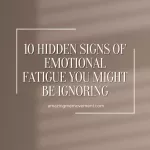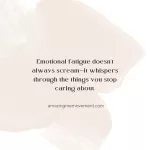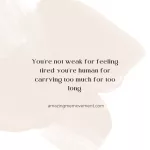In today’s world, exhaustion doesn’t always come from physical labor or sleepless nights. Sometimes, it creeps in quietly—through stress, overthinking, constant responsibility, and emotional overload. Emotional fatigue can take root even when everything on the outside seems “fine.” You keep showing up, but inside, you’re running on empty. If you’ve ever felt drained for no apparent reason, struggled to care about things you once loved, or felt like you’re just “getting through” the day, you might be facing signs of emotional fatigue without realizing it.

In this article, you’ll discover:
- The most overlooked signs of emotional fatigue that go beyond feeling tired
- How emotional fatigue affects your body, mind, and behavior
- What mental burnout signs to watch for before it deepens
- Why pushing through may be doing more harm than good
- Actionable tips on how to recover from emotional fatigue
Let’s dig into the subtle signs your body and soul may be trying to tell you something.
20 Self-Care Quotes: Choose To Prioritize Yourself Without Guilt
What Is Emotional Fatigue?

Emotional fatigue, also called emotional exhaustion, is a state of chronic stress that drains your mental and emotional energy. Unlike regular tiredness that improves with rest, emotional fatigue lingers—making it hard to focus, connect, or care. It’s the burnout that comes from carrying invisible loads: grief, responsibility, worry, trauma, or constant self-sacrifice.
People experiencing emotional exhaustion symptoms often report feeling “numb,” easily irritated, or overwhelmed by even minor tasks. Over time, this exhaustion can spill into physical health, relationships, work performance, and overall well-being.
10 Hidden Signs of Emotional Fatigue You Might Be Ignoring

Here are some often-overlooked emotional and mental burnout signs that could indicate deeper emotional exhaustion:
1. You Feel Emotionally Numb or Disconnected
You’re going through the motions but feel disconnected from yourself or others. Even things that used to excite or move you now barely register. This emotional flatness is a red flag that your internal reserves are depleted.
2. Small Tasks Feel Overwhelming
Simple things like replying to a text, washing dishes, or opening an email feel like climbing a mountain. Emotional fatigue shrinks your capacity to cope, making basic routines feel impossible.
3. You’re Constantly Irritated or On Edge
Everything seems to set you off lately—loud noises, delays, interruptions. When you’re emotionally depleted, your nervous system becomes hypersensitive.
20 Quotes About Emotional Scars To Help Your Healing Journey
4. You Crave Escape More Than Rest
You’re not just tired—you’re desperate to avoid your own thoughts. Scrolling, binge-watching, or oversleeping become ways to disconnect. This form of emotional avoidance is often mistaken for “self-care.”
5. You Feel Guilty for Needing Help
You’re exhausted but still struggle to ask for support. You downplay your pain or fear being “too much.” This mindset often delays healing and deepens emotional fatigue.
6. You Have Trouble Sleeping—or Want to Sleep All the Time
Your sleep is either disrupted, restless, or all you want to do. Emotional fatigue can mimic both insomnia and hypersomnia as your mind tries to either process or escape the overload.
7. You’ve Lost Your Spark and Creativity
You used to enjoy journaling, baking, planning, or painting—but now nothing feels inspiring. This emotional flatness is often one of the earlier mental burnout signs.
7 Stress Management Techniques for Busy Women
8. You Feel Like You’re Faking It
You smile, perform, and go to work—but inside you feel empty or resentful. Living inauthentically can be emotionally exhausting and widen the gap between who you are and what you’re showing the world.
9. You Avoid Social Interactions
You might cancel plans or avoid answering calls because connecting feels like “too much.” Social withdrawal is a self-protective response that signals burnout.
10. Your Body Feels Heavy, Tight, or Achy
Emotional fatigue often shows up physically. Headaches, muscle tension, digestive issues, or a persistent feeling of heaviness can be signs your nervous system is under chronic stress.
How to Recover from Emotional Fatigue

Healing emotional fatigue takes more than just sleep or time off. It requires a full-spectrum approach to recharging your nervous system, reconnecting with yourself, and redefining your limits.
1. Acknowledge What You’re Feeling
Name it to tame it. Admitting that you’re emotionally fatigued is the first step to recovery. Often, we push away our feelings out of guilt or fear of appearing weak. But emotional honesty is healing. Start by journaling your emotions or simply speaking them out loud to someone you trust. Giving your feelings a voice creates the space needed to process them.
2. Set Boundaries That Actually Protect You
Say no more often. Reduce your exposure to people or tasks that drain you. Boundaries are not rejection—they are redirection toward self-preservation. Think about where you feel resentment—that’s often a sign your boundaries are being crossed. Set limits around your time, energy, and emotional availability. Honor your need for rest without over-explaining it to others.
3. Prioritize Rest That Restores
Not all rest is equal. Focus on restorative rest: naps, meditation, slow walks, creative hobbies. True rest isn’t just physical—it’s emotional and spiritual, too. Make space in your schedule for moments of intentional stillness. Disconnect from screens. Take a mindful breath. Let your nervous system reset, not just your calendar.
4. Reconnect With Your Body
Stretch, dance, cry, breathe deeply. Physical movement can help release the emotional tension stored in your body. Your body holds the score of your emotional state—so listen to it. Grounding practices like walking barefoot on grass, slow yoga, or placing your hand on your chest while breathing can bring you back to center.
5. Ask for Help Without Guilt
Whether it’s a therapist, a friend, or a spiritual guide—you don’t have to carry this alone. Connection is part of recovery. Start small. Share one honest sentence. Vulnerability can feel scary, but it’s the bridge to true support. You are worthy of help, even if your mind tries to convince you otherwise.
5 Simple Self Care Tips To Help You Put Yourself First
Your Healing Is A Priority
The signs of emotional fatigue are often easy to ignore—until your mind, body, and spirit force you to pay attention. If you see yourself in any of the signs above, know that you are not broken, lazy, or weak. You are simply tired in a way that rest alone can’t fix.
Recognizing emotional exhaustion symptoms is not a setback; it’s a turning point. It’s the moment you begin to choose yourself again.
So pause. Breathe. Listen. And start the journey back to yourself.
- 6 Warning Signs of Mental Exhaustion (You Should Never Ignore!!)
- Signs You’re Burnout From Work And How To Fix It
- Top 7 Tips You Can Try To Avoid Feeling Burnout From Work
- 16 Fun Self Care Activities For Your Mind and Soul











Leave a Reply